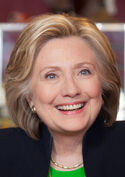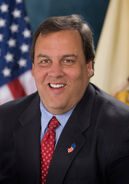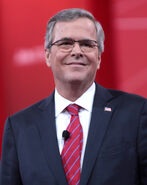| 2016 | ||||
| US Presidential election, 2020 (Kanade500, outdated) | ||||
|---|---|---|---|---|
| September 5th, 2020 | ||||

|

|

| ||
| Party | Democratic | Republican | Libertarian | |
| Percentage | 36% | 32% | 21% | |

|
||||
| Party | Independent
| |||
| Percentage | 9% | |||
The US presidential election of 2020 was the 59th quadrennial presidential election. It was held on November 3rd, 2020. Democratic Nominee and Incumbent Hillary Clinton and her running mate Julian Castro, were elected to a second term winning the popular vote and the electoral vote. However she won with a very decreased margin from 2016, no longer winning the election in a landslide.
This election saw the rise of the Libertarian Party from being a small third party to becoming a real major party, and the party was expected to overtake the weakened Republican party as the next 2nd party. However the Republican Party managed to keep a strong hold on the south which was no longer split.
Another notable candidate was Kanye West who ran as independent. Democrats feared that he would spoil Clinton's candidacy but performed underwhelming for the media attention he was getting.
Background[]
Hillary Clinton's presidency has largely been regarded as a third term of Obama, continuing his healthcare and spending plans. Under her administration deficit spending saw a huge spike and unemployment increased, this was mainly caused due to a rise in public spending and heavy foreign interventionism overseas with the threat of ISIS. Her economic and foreign policies where proven to be unpopular, however she did manage to keep a decent approval rating through her policies that improved relations with minority and LGBT communities, she also gained widespread approval for improving economic conditions in Cuba by opening trade.
The Libertarian nomination Rand Paul gained prominence for his staunch opposition and criticism of Clinton's policies, strongly criticizing her hawkish interventionism and public spending. His campaign proved to be much more assertive and populist compared to his 2016 run, and his strong focus on non-interventionist ideas, civil liberties, and fiscal conservatism proved to have a lot of appeal for both the left and the right.
Chris Christie on the other hand continued his support of collecting metadata of citizens and strengthening NSA security in order to fight terrorism, which proved to be more popular with social conservatives. He also adopted anti-immigration and anti-free trade policies inspired by Donald Trump's run in 2016. While many thought this would be the last election of the nearly collapsed Republican Party, Christie's brash and assertive attitude during the debates gained him strong support, leading to a comeback for Republicans.
Kanye West ran his platform largely on single issues such as more support for the black community and legalizing marijuana. West strongly criticized Hillary Clinton over her stance on drugs saying that the war on drugs was very damaging to the black community.
Nominations[]
Democratic Party[]
- Hillary Clinton, 45th President of the United States (Incumbent)
Clinton's nomination went mostly unchallenged due to her incumbency and being the only viable candidate ballot wise. She only received opposition from lesser-known candidates, most notably an Occupy activist who ran on a platform inspired by Bernie Sanders.
Republican Party[]
- Chris Christie, Governor of New Jersey (Nominee)
- Tom Cotton, Senator from Arkansas
- Jeb Bush, former Governor of Florida
- Ivanka Trump, Executive Vice President of Development & Acquisitions at the Trump Organization
Due to the weakened state of the Republican Party caused by the 2016 presidential election the amount of candidates seeking nomination was significantly less than the previous election, with only four running. Chris Christie became the front-runner very quickly early on, with the bridgegate scandal being largely forgotten about and his assertive style winning him the debates.
Tom Cotton however proved to be a strong competitor thanks to his youth and his wide appeal to both Tea Partiers and the Establishment wing. He criticized Christie for being too moderate on economic policies and attacked him for his endorsement of Donald Trump in 2016.
Jeb Bush attempted another run, however his bad impression during the 2016 left a scar on his campaign. As he was polling poorly and considered a weak leader, he dropped out before the primary and endorsed Tom Cotton, ending his political career.
The party was surprised when Ivanka Trump, daughter of Donald Trump decided to run, running on the same populist, anti-immigrant, anti-free trade platform her father did in hopes to keep up his legacy. She gained strong momentum as soon as she announced and beat Christie and Cotton in polls for a while, however her momentum dwindled quickly because she lacked the charisma her father did. She dropped out during the primary endorsing Chris Christie.
The primary went on with neither Christie nor Cotton getting a serious lead on each other, however Chris Christie would eventually win a majority of delegates and Cotton conceded defeat. Christie picked Ivanka Trump as his running mate causing many conservatives to fear that Chris Christie would be a second Donald Trump run.
Libertarian Party[]
- Rand Paul, Senator from Kentucky (Nominee)
- Adam Kokesh, Anarcho-capitalist activist and anti-war Veteran
- Adrian Wyllie, Libertarian Party candidate for Florida gubernatorial elections in 2014
After the 2016 election where the LP reached the threshold to become a major party, the massive defeat of the Republican Party caused many conservative and libertarian members to join the Libertarian Party, many politicians of the Republican Party decided to switch to the LP as wel, most notably Rand Paul.
Rand Paul quickly became the party's front-runner and was expected to win the nomination quite easily, presenting himself as more assertive and anti-establishment than he was in 2016 but also keeping his views appealing to the mainstream.
His strongest opponent was the anarcho-capitalist activist Adam Kokesh, who is running his campaign on the promise to abolish government in four years. He accused Rand Paul of being a sell-out and not a true libertarian that adheres to the non aggression principle.
Another challenger was Adrian Wyllie, who ran as Florida governor on the LP ticket in 2014. He considered Rand Paul to be too socially conservative while Adam Kokesh too extreme, promising he would make a principled libertarian middle ground between the two.
In the end neither posed a significant challenge to Rand Paul, who won the primary in the first ballot with a strong majority. Paul picked Justin Amash as his running mate.
Other Parties and Independents[]
Independents[]
Rapper Kanye West announced his candidacy back in 2015, there was a lot of speculation on whether he was serious about it. He officially confirmed his candidacy in 2018 where he said he would run as an independent. He picked Taylor Swift as his running mate.
Former Senator of Virginia Jim Webb also decided to run as Independent, saying that he speaks for the angry working class that voted for Trump
Other independent candidates include journalist Dan Rattiner, Harvard Law Professor Lawrence Lessig, and Transhumanist author Zoltan Istvan.
Green Party[]
Green Party members attempted to nominate Bernie Sanders, however Sanders declined due to age.
The two main candidates for the nomination were Comedian Rosseane Barr who did an unsucesful bid for the Green party nomination in 2012, and anti-poverty activist Cheri Honkala who was Jill Stein's running mate during the 2012 election.
Barr lost the nomination due to the controversy of her history of threats and doxing towards George Zimmerman and his family. Honkala chose Kent Mesplay as her running mate.
Results[]
Early on it was expected that Hillary Clinton would easily win through a spoiler effect by Rand Paul and Chris Christie splitting the vote, however as polls showed that Rand Paul benefited from voters on both sides, as well as Kanye West gaining popularity with black demographics people saw Clinton losing as a very possible chance.
Chris Christie trailed behind Rand Paul, Kanye West, and Hillary Clinton for a while due to the damaged reputation of the party, but his unique and assertive debate style allowed him to make strong gains in the polls and get support from the south. The party's future would depend on whether he was able to win Texas. Rand Paul on the other hand had to rely on getting a mix of blue states and red states if he wanted to win and not give either party a spoiler effect.
Kanye West had a huge head start in the polls thanks to celebrity endorsements and media hype, this allowed him to poll ahead of Clinton in California and many other important blue states, analysts considered California to be the determining state on whether Clinton would win or lose. However West quickly fell down the poll as he failed to keep up the media attention, his lack of political experience and inability to catch on to specific demographics led to an underperforming campaign.
In the end Hillary Clinton managed to win the popular vote and electoral vote, just barely winning California, as well as winning most east coast states and swing states such as Ohio and Florida. Chris Christie managed to overtake the second place over Rand Paul by winning many important southern states including Texas, which was considered a comeback for the Republicans despite the loss.
Rand Paul went on to win many west coast states as well as New Hampshire and his home state Kentucky, however while he managed to carry as many states as Chris Christie did, those states had less electoral votes. Paul's victory relied strongly on whether he would be able to win the swing states, but was unable to.
Kanye West took four blue states, primarily states that have higher populations of black people. West was very disappointed in the run and decided to go back to his music career stating that politics was not his thing after all.
| Candidate | Party | Percentage |
|---|---|---|
| Hillary Clinton | Democrat | 36% |
| Chris Christie | Republican | 32% |
| Rand Paul | Libertarian | 21% |
| Kanye West | Independent | 9% |
| Jim Webb | Independent | 0,9% |
| Cheri Honkala | Green | 0,7% |
| Others | Others | 0,4% |








